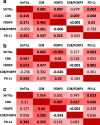Immune characterization of breast cancer metastases: prognostic implications
- PMID: 29929548
- PMCID: PMC6013851
- DOI: 10.1186/s13058-018-1003-1
Immune characterization of breast cancer metastases: prognostic implications
Abstract
Background: Tumor-infiltrating lymphocytes (TILs) evaluated in primary breast cancer (BC) convey prognostic information. Limited data in the metastatic setting are available.
Methods: Secondary lesions from 94 BC patients, 43 triple-negative (TN) and 51 HER2-positive, were evaluated for TILs and expression of CD8, FOXP3, and PD-L1 by immunohistochemistry.
Results: TILs levels on metastasis were generally low (median 5%) and did not differ between TN and HER2+ tumors. Younger patients showed significantly lower TILs (p = 0.002). In HER2+ patients, TILs were higher in lung metastases as compared to other sites (p = 0.038). TILs composition was different across metastatic sites: skin metastases presented higher FOXP3 (p = 0.002) and lower CD8/FOXP3 ratio (p = 0.032). Patients treated for metastatic BC prior to biopsy had lower CD8 (overall: p = 0.005, HER2+: p = 0.011, TN: p = 0.075). In TN patients, median overall survival (OS) was 11.8 and 62.9 months for patients with low and high TILs, respectively (HR 0.29, 95%CI 0.11-0.76, log-rank p = 0.008). CD8/FOXP3 ratio was also prognostic in TN patients (median OS 8.0, 13.2, and 54.0 months in 1st, 2nd and 3th tertile, log-rank p = 0.019). Both TILs and CD8/FOXP3 ratio were independent factors at multivariate analysis. Counterintuitively, in HER2+ BC, low TILs tumors showed better prognosis (median OS 53.7 vs 39.9 months in TILs low and TILs high, not statistically significant).
Conclusions: Our findings indicate the relevance of TILs as prognostic biomarker for TNBC even in the advanced setting and provide novel hypothesis-generating data on potential sources of immune heterogeneity of metastatic BC.
Keywords: HER2; Metastatic breast cancer; PD-L1; Triple negative; Tumor-infiltrating lymphocytes.
Conflict of interest statement
Ethics approval and consent to participate
This research has been conducted in accordance with the Declaration of Helsinki. The study protocol has been approved by the Ethics Committee of Istituto Oncologico Veneto IRCCS of Padova and the Ethics Committee of Modena University Hospital. Patients signed the informed consent form.
Competing interests
The authors declare that they have no competing interests.
Publisher’s Note
Springer Nature remains neutral with regard to jurisdictional claims in published maps and institutional affiliations.
Figures



References
-
- Dieci MV, Criscitiello C, Goubar A, Viale G, Conte P, Guarneri V, et al. Prognostic value of tumor-infiltrating lymphocytes on residual disease after primary chemotherapy for triple-negative breast cancer: a retrospective multicenter study. Ann Oncol. 2014;25(3):611–618. doi: 10.1093/annonc/mdt556. - DOI - PMC - PubMed
-
- Loi S, Sirtaine N, Piette F, Salgado R, Viale G, Van Eenoo F, et al. Prognostic and predictive value of tumor-infiltrating lymphocytes in a phase III randomized adjuvant breast cancer trial in node-positive breast cancer comparing the addition of docetaxel to doxorubicin with doxorubicin-based chemotherapy: BIG 02-98. J Clin Oncol. 2013;31(7):860–867. doi: 10.1200/JCO.2011.41.0902. - DOI - PubMed
-
- Loi S, Michiels S, Salgado R, Sirtaine N, Jose V, Fumagalli D, et al. Tumor infiltrating lymphocytes are prognostic in triple negative breast cancer and predictive for trastuzumab benefit in early breast cancer: results from the FinHER trial. Ann Oncol. 2014;25(8):1544–1550. doi: 10.1093/annonc/mdu112. - DOI - PubMed
Publication types
MeSH terms
Substances
LinkOut - more resources
Full Text Sources
Other Literature Sources
Medical
Molecular Biology Databases
Research Materials
Miscellaneous

